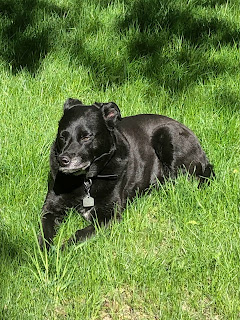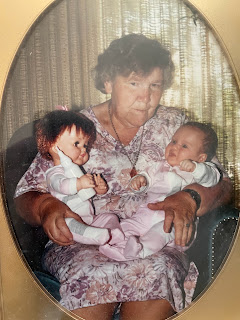 |
| The dog who likes late-night walks |
Without our dogs I would not have explored this neighbourhood like I have. I would definitely not have discovered the joys of late night walks, no matter what the weather, and I would not have seen last week's northern lights.
I've experienced the aurora borealis several times over the years. One memorable time was camping out at Hecla on Lake Winnipeg. The northern lights put on an awesome display over the vast lake and were the inspiration behind my scene in The Kulak's Daughter/Red Stone when the kulak children were out rabbit hunting on the snowy Siberian steppe.
 |
| Northern Lights in Winnipeg, Canada |
Putting northern lights into a Siberian scene was a no-brainer for me because my mom, the inspiration for the novel's protagonist, Olga/Katya, liked to compare our prairie weather to Siberia. "Just like Siberia," she'd often quip. It was a huge disappointment for her ... something she could not forgive me for ... that I chose to work outside as a mail carrier while raising my three kids. She'd say, "I didn't survive Siberia so my daughter could freeze in Winnipeg." In fact, it took four years of hiding my winter gear when she came to visit, before I finally shared my shameful truth. Yes, I worked outside in Winnipeg's Siberia-like winter. I tried to tell her about the many layers of clothes I wore, of the good boots I had, and of the warm, nourishing breakfast I'd start out with. It didn't matter. She'd raised me to be smart, not a fool who trudged through snow and cold. Still, I've no regrets. While I haven't been able to visit Siberia yet, Siberia—its cold, its snow, its dancing lights— feels familiar.
And... the point of all this, is that Bookbird: A Journal of International Children's Literature, recently published an article by Dr. Mateusz Swietlicki and Sylwia Kaminska-Maciag called Northern Lights are Our Friends: Soviet Deportations and Siberian Nature in Children's and Young Adult Literature.
So you never know what a night walk, a dog and an old woman's Siberian memories can have in common. In the IBBY article, the two co-authors reference how the vastness of the Russian landscape affected the young exiles in the more than a dozen works cited. Experiencing nature is research and a wonderful perk of a writer's life.












